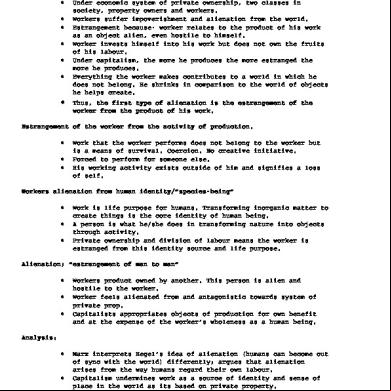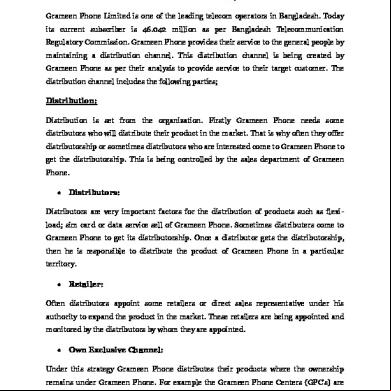Contract Of Sale Of Goods 4n123w
This document was ed by and they confirmed that they have the permission to share it. If you are author or own the copyright of this book, please report to us by using this report form. Report 3i3n4
Overview 26281t
& View Contract Of Sale Of Goods as PDF for free.
More details 6y5l6z
- Words: 1,150
- Pages: 16
CONTRACT OF SALE OF GOODS
Definition and essentials of a contract of sale The law relating to sale of goods is contained in the Sales of Goods Act,1930. The act contains sixty-six Sections. A contract of sale of goods results by an offer by one party and its acceptance by the other. Section 4(1) of the Sale of Goods Act defines a contract of sale of goods as- “a contract whereby the seller transfers or agrees to transfer the property in goods to the buyer for a price.”
The essential elements of a contract for the sale of goods are enumerated below: 1.Two parties: The first essential is that there must be two distinct parties to a contract of sale, viz., a buyer and a seller, as a person cannot buy his own goods. 2. Goods: The subject-matter of the contract of sale must be ‘goods’. Goods means every kind of movable property other than actionable claims and money. Goodwill, trade marks, copyrights, patents right, water, gas, shares, stock are included in goods.
3.Price:The consideration for a contract of sale must be money consideration called the ‘price’. If goods are sold or exchanged for other goods, the transaction is barter, governed by the Transfer of Property Act and not a sale of goods under this Act. 4. Formation of the contract of sale: A contract of sale is made by an offer to buy or sell goods for a price and the acceptance of such offer. The contract may provide for the immediate delivery of the goods or immediate payment of the price or both.
5. Method of forming the contract: Subject to the provision of any law for the time being in force, a contract of sale may be in writing, or by word of mouth, or may be implied from the conduct of the parties. 6. The of contract: The parties may agree upon any term concerning the time, place, and mode of delivery. The may be of two types: essential and non-essential. • Essential are called Conditions. • Non-essential are called Warranties.
7.Other essential elements: A contract for the sale of goods must satisfy all the essential elements necessary for the formation of a valid contract, such as• The parties must be competent to contract. • There must be free consent. • There must be consideration. • The object must be lawful etc.
Sale distinguished form hire purchase A hire purchase agreement is one under which a person takes delivery of goods promising to pay the price by a certain number of installments and until full payment is made, to pay hire charges for using the goods. The main points of distinction between the ‘sale’ and ‘hirepurchase’ are as follows1. In a sale, property in the goods is transferred to the buyer immediately at the time of contract, whereas in hire-purchase the property in the goods es to the hirer upon payment of the last installment.
2. In a sale the position of the buyer is that of the owner of the goods but in hire purchase the position of the hirer is that of a bailee till he pays the last installment. 3. In the case of a sale, the seller takes the risk of any loss resulting from the insolvency of the buyer. In the case of hire purchase, the owner takes no such risk, for if the hirer fails to pay an installment the owner has the right to take back the goods.
4. In the case of a sale, the buyer can a good title to a bona fide purchaser from him but in a hire-purchase, the hirer cannot any title even to a bona fide purchaser. 5. In a sale, sales tax is levied at the time of the contract whereas in a hire-purchase sales tax is not leviable until it eventually ripens into a sale.
Kinds of goods The term “Goods” includes every kind of movable property except (i) actionable claims and (ii) money.-Sec.2(7) Goods may be classified into the following types: 1. Existing goods 2. Future goods and 3. Contingent goods
1. Existing goods: Existing goods are goods which are already in existence and which are physically present in some person’s possession and ownership.-Sec.6(1). Existing goods may be either(i)Specific and ascertained or (ii) Generic and unascertained (i) Specific goods: Specific goods are goods which can be clearly identified and recognized as separate things. Example: A particular picture by a painter, a ring with distinctive features, goods identified and agreed upon at the time of the contract of sale etc.
(ii) Unascertained goods: Unascertained goods are goods indicated by description and not separately identified. Example: If A agrees to sell to B one bag of sugar out of the lot of one hundred bags lying in his godown, it is a sale of unascertained goods because it is not known which bag is to be delivered. 2.Future goods: Future goods are goods which will be manufactured or produced or acquired by the seller after the making of the contract of sale.Sec.2(6).
Example: P agrees to sell to Q all the mangoes which will be produced in his garden next year. This is an agreement for the sale of future goods. 3.Contingent goods: Goods, the acquisition of which by the seller depends upon an uncertain contingency are called ‘contingent goods’. –Sec 6(2). Example- X agrees to sell to Y 25 bales of Egyptian cotton, provided the ship which is bringing them reaches the port safely. It is a contract for the sale of contingent goods. If the ship is sunk, the contract becomes void and the seller is not liable.
Conditions and warranties Section 12 of the Sale of Goods Act states that a stipulation (or term) in a contract of sale with reference to goods may be a condition or a warranty. ConditionA condition is a stipulation essential to the main purpose of contract, the breach of which gives rise to a right to treat the contract as repudiated.-Sec.12(2)
Warranty A warranty is a stipulation collateral to the main purpose of the contract, the breach of which gives rise to a claim for damages but not a right to reject the goods and treat the contract as repudiated.-Sec.12(3).
Condition and warranty distinguished 1. As to value- A condition is a stipulation which is essential to the main purpose of the contract, whereas a warranty is a stipulation which is collateral to the main purpose of the contract. 2. As to breach- The breach of a condition gives the aggrieved party the right to repudiate the contract and also to claim damages, whereas the breach of warranty gives the aggrieved party a right to claim damages only. 3. As a treatment- A breach of condition may be treated as a breach of warranty. But a breach of warranty cannot be treated as a breach of condition.
Definition and essentials of a contract of sale The law relating to sale of goods is contained in the Sales of Goods Act,1930. The act contains sixty-six Sections. A contract of sale of goods results by an offer by one party and its acceptance by the other. Section 4(1) of the Sale of Goods Act defines a contract of sale of goods as- “a contract whereby the seller transfers or agrees to transfer the property in goods to the buyer for a price.”
The essential elements of a contract for the sale of goods are enumerated below: 1.Two parties: The first essential is that there must be two distinct parties to a contract of sale, viz., a buyer and a seller, as a person cannot buy his own goods. 2. Goods: The subject-matter of the contract of sale must be ‘goods’. Goods means every kind of movable property other than actionable claims and money. Goodwill, trade marks, copyrights, patents right, water, gas, shares, stock are included in goods.
3.Price:The consideration for a contract of sale must be money consideration called the ‘price’. If goods are sold or exchanged for other goods, the transaction is barter, governed by the Transfer of Property Act and not a sale of goods under this Act. 4. Formation of the contract of sale: A contract of sale is made by an offer to buy or sell goods for a price and the acceptance of such offer. The contract may provide for the immediate delivery of the goods or immediate payment of the price or both.
5. Method of forming the contract: Subject to the provision of any law for the time being in force, a contract of sale may be in writing, or by word of mouth, or may be implied from the conduct of the parties. 6. The of contract: The parties may agree upon any term concerning the time, place, and mode of delivery. The may be of two types: essential and non-essential. • Essential are called Conditions. • Non-essential are called Warranties.
7.Other essential elements: A contract for the sale of goods must satisfy all the essential elements necessary for the formation of a valid contract, such as• The parties must be competent to contract. • There must be free consent. • There must be consideration. • The object must be lawful etc.
Sale distinguished form hire purchase A hire purchase agreement is one under which a person takes delivery of goods promising to pay the price by a certain number of installments and until full payment is made, to pay hire charges for using the goods. The main points of distinction between the ‘sale’ and ‘hirepurchase’ are as follows1. In a sale, property in the goods is transferred to the buyer immediately at the time of contract, whereas in hire-purchase the property in the goods es to the hirer upon payment of the last installment.
2. In a sale the position of the buyer is that of the owner of the goods but in hire purchase the position of the hirer is that of a bailee till he pays the last installment. 3. In the case of a sale, the seller takes the risk of any loss resulting from the insolvency of the buyer. In the case of hire purchase, the owner takes no such risk, for if the hirer fails to pay an installment the owner has the right to take back the goods.
4. In the case of a sale, the buyer can a good title to a bona fide purchaser from him but in a hire-purchase, the hirer cannot any title even to a bona fide purchaser. 5. In a sale, sales tax is levied at the time of the contract whereas in a hire-purchase sales tax is not leviable until it eventually ripens into a sale.
Kinds of goods The term “Goods” includes every kind of movable property except (i) actionable claims and (ii) money.-Sec.2(7) Goods may be classified into the following types: 1. Existing goods 2. Future goods and 3. Contingent goods
1. Existing goods: Existing goods are goods which are already in existence and which are physically present in some person’s possession and ownership.-Sec.6(1). Existing goods may be either(i)Specific and ascertained or (ii) Generic and unascertained (i) Specific goods: Specific goods are goods which can be clearly identified and recognized as separate things. Example: A particular picture by a painter, a ring with distinctive features, goods identified and agreed upon at the time of the contract of sale etc.
(ii) Unascertained goods: Unascertained goods are goods indicated by description and not separately identified. Example: If A agrees to sell to B one bag of sugar out of the lot of one hundred bags lying in his godown, it is a sale of unascertained goods because it is not known which bag is to be delivered. 2.Future goods: Future goods are goods which will be manufactured or produced or acquired by the seller after the making of the contract of sale.Sec.2(6).
Example: P agrees to sell to Q all the mangoes which will be produced in his garden next year. This is an agreement for the sale of future goods. 3.Contingent goods: Goods, the acquisition of which by the seller depends upon an uncertain contingency are called ‘contingent goods’. –Sec 6(2). Example- X agrees to sell to Y 25 bales of Egyptian cotton, provided the ship which is bringing them reaches the port safely. It is a contract for the sale of contingent goods. If the ship is sunk, the contract becomes void and the seller is not liable.
Conditions and warranties Section 12 of the Sale of Goods Act states that a stipulation (or term) in a contract of sale with reference to goods may be a condition or a warranty. ConditionA condition is a stipulation essential to the main purpose of contract, the breach of which gives rise to a right to treat the contract as repudiated.-Sec.12(2)
Warranty A warranty is a stipulation collateral to the main purpose of the contract, the breach of which gives rise to a claim for damages but not a right to reject the goods and treat the contract as repudiated.-Sec.12(3).
Condition and warranty distinguished 1. As to value- A condition is a stipulation which is essential to the main purpose of the contract, whereas a warranty is a stipulation which is collateral to the main purpose of the contract. 2. As to breach- The breach of a condition gives the aggrieved party the right to repudiate the contract and also to claim damages, whereas the breach of warranty gives the aggrieved party a right to claim damages only. 3. As a treatment- A breach of condition may be treated as a breach of warranty. But a breach of warranty cannot be treated as a breach of condition.










